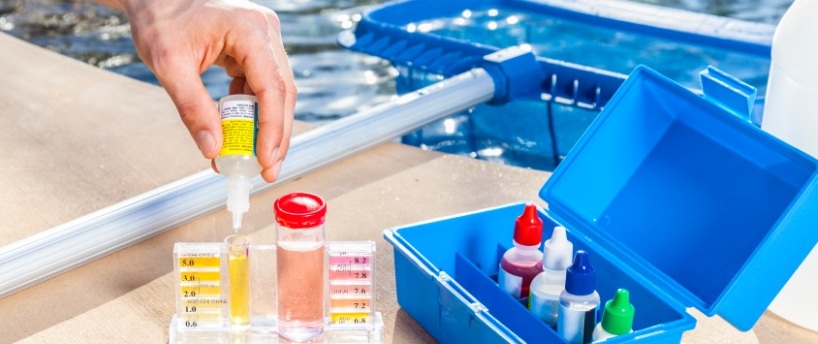Testing is the first step to check for perfect water and perfect water balance. Just a few days before the pool season is going to start, do take a water sample to your nearest pool store to analyze it professionally. You should do this at least once a month and you should test your water at home, with a test kit or test strips, at least once a week.
There’s wide range of testing kits for pool water testing including “test strip” kits and “drop” kits. The kit should measure the full range of the chemical levels in your pool. Following are the chemicals you should test for as well as the recommended levels of each.
| TYPES OF CHEMICALS | RECOMMENDED LEVELS |
| Chlorine | 1.0 ppm to 5.0 ppm |
| pH | 7.2 ppm to 7.6 ppm |
| Total Alkalinity | 80ppm to 110 ppm |
| Calcium Hardness | 300 ppm to 350 ppm |
| Cyanuric Acid | 40 ppm to 60 ppm |
| Sequest | 10 ppm to 15 ppm |
Irrespective of what type of pool you have, it is more necessary to test the chemical levels regularly on an interval. Also keep a note of a fact that the range of chemical levels will change quickly after rain. . So make sure to keep an eye on your water balance. Once the water balance is up-to-date, the life of it will increase. Ideally, you should test the water in your pool every day, but this is not possible for most pool owners because of the hectic schedule of daily living. I recommend that you try to test every other day and at least 2 times per week.
To protect your investment you made in your pool and to protect your family’s health, pool water testing is the foremost thing you need to do and to let it happen, a test kit is your primary analysis tool. For these reasons it just makes sense to purchase a good quality test kit that gives accurate results. It’s far better to pay a little more for protection than to end up paying for a damaged pool or suffering health problems.
Water Balance
Pool water completely depends on the 2 main essentials, balance and harmony. The same goes for your pool water. Balance of everything will lead to zero issues with your pool, including cloudiness and algae.
Water balance and testing both are extremely important for number of reasons.
- It helps sanitizing chemicals to work effectively.
- It lessens the chance for water problems.
- It lengthens the life of your pool equipment.
Pool Chemicals – Working Condition
Maintaining the pH balance in your water will ensure you get the most out of your sanitizing chemicals. For instance, in water with low pH, your water is more acidic and will eat up the sanitizer faster. This doesn’t give your sanitizer enough time to do its job properly.
Many swimming pool owners regularly use chlorine to keep the pool water in a proper condition. There are several other ways to keep the water in a balanced form by using ozone gases, ionization as well as at time UV sterilizations.
Chlorine:
There are mainly three important methods of keeping the pool chlorinated:
- First is to add the chlorine physically.
- Secondly, install a chlorinator that yields chlorine from.
- Lastly, fixing a liquid feeder, a chemical one, this result into adding chlorine routinely.
Protect Your Equipment
Low pH causes your water to be acidic. In this case, your water will do whatever it takes to increase its pH level. Your water wants to be balanced. It’ll start to take what it needs from PVC, vinyl, concrete, and other parts of the pool, thus corroding and deteriorating your pool and equipment.
